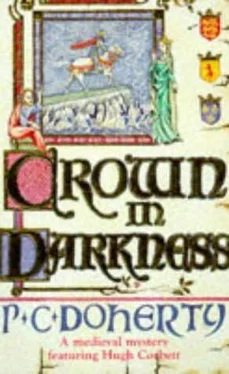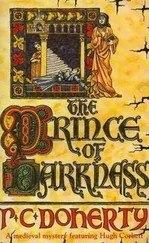Paul Doherty - Crown in Darkness
Здесь есть возможность читать онлайн «Paul Doherty - Crown in Darkness» весь текст электронной книги совершенно бесплатно (целиком полную версию без сокращений). В некоторых случаях можно слушать аудио, скачать через торрент в формате fb2 и присутствует краткое содержание. Жанр: Исторический детектив, на английском языке. Описание произведения, (предисловие) а так же отзывы посетителей доступны на портале библиотеки ЛибКат.
- Название:Crown in Darkness
- Автор:
- Жанр:
- Год:неизвестен
- ISBN:нет данных
- Рейтинг книги:4 / 5. Голосов: 1
-
Избранное:Добавить в избранное
- Отзывы:
-
Ваша оценка:
- 80
- 1
- 2
- 3
- 4
- 5
Crown in Darkness: краткое содержание, описание и аннотация
Предлагаем к чтению аннотацию, описание, краткое содержание или предисловие (зависит от того, что написал сам автор книги «Crown in Darkness»). Если вы не нашли необходимую информацию о книге — напишите в комментариях, мы постараемся отыскать её.
Crown in Darkness — читать онлайн бесплатно полную книгу (весь текст) целиком
Ниже представлен текст книги, разбитый по страницам. Система сохранения места последней прочитанной страницы, позволяет с удобством читать онлайн бесплатно книгу «Crown in Darkness», без необходимости каждый раз заново искать на чём Вы остановились. Поставьте закладку, и сможете в любой момент перейти на страницу, на которой закончили чтение.
Интервал:
Закладка:
Eventually they found the "Saint Andrew", a large warlike craft with a bluff tub-like hull. The body of the ship rose high above the quay, its stern crowned by small castles or crenellated fighting-platforms to protect archers and soldiers during battle. The huge single mast had its large sail furled under the platform used by the look-out. Sir James hailed the ship, telling the crew they were coming aboard and a large gangplank was lowered. Sir James ordered one of his retinue to stay and stable the horses while he and Corbett, accompanied by the remainder of his party, made their way carefully up the gangplank and into the busy ship. The crew moved about jostling each other; Corbett gathered that the ship had recently returned to port and the crew were busily cleaning the decks. He saw a vast patch of blood and guessed that the ship must have been in one of the many petty skirmishes which took place at sea, for ships of various nations, Norway, Denmark, England, Scotland and France used these waters for fishing, trade and piracy.
A young, red-haired man, dressed simply in a leather jerkin, leggings and boots, came up to Corbett and spoke in an accent the English clerk could not even hope to follow. Selkirk, however, made himself clearly understood. The man, curious, looked narrowly at Corbett and was about to refuse until Selkirk showed him Wishart's sealed warrant. The captain, for Corbett guessed it must be he, let out a litany of rich oaths in a variety of languages leaving Corbett in no doubt about his feelings concerning the mission. Nevertheless, the fellow began to bark orders. The decks were cleared; sailors began to run like monkeys up the rigging unfurling the great sail, while two more were sent up to the stern-castle to manage the huge tiller. After a while the captain, much calmer, took Selkirk and Corbett down to his cabin under the fo'castle, a small, dingy room smelling of tar and salt, and containing a simple cot bed, trunk, table and a number of stools. Corbett, unused to the gentle rocking of the ship and the low beams, banged his head as he straightened up. The pain was intense and though the captain laughed at his discomfort, he offered Corbett a cup of surprisingly good wine to ease the pain and, as Selkirk put it, strengthen his stomach for the coming voyage.
Within an hour of embarkation, the "Saint Andrew" had turned and was making its way across the Firth, The pain in Corbett's head subsided only to be replaced by a growing sense of nausea as the ship rocked and rolled on the water. Selkirk sat enjoying the English clerk's discomfort. 'Come, Master Corbett,' he said jovially. 'You had best come up on deck if you are to be sick. You cannot vomit here and upset our host. Moreover, he will need direction.' Corbett muttered curses but followed Selkirk up the ladder and on to the deck of the ship. The large sail, now unfurled, was billowing in the strong wind as the ship circled across the water towards the far-distant shoreline. The Firth was much broader here than at Dalmeny and, if it had not been a clear day, Corbett could have almost believed they were out on the open sea. The captain showed them a rough map drawn crudely on tough, brown vellum and with a stubby finger and guttural comments pointed out the coastline of Fife, the manor of Kinghorn and the possible place where the French could dock to pick up a party from the beach. 'What is he saying?' Corbett asked. Selkirk shrugged. 'There is no port at Kinghorn but there are a number of fishing villages and coves along the coast where Queen Yolande would go to wait for the ship. It is a question of simply following the coast down until we actually catch sight of the ship itself.' Selkirk looked up at the darkening sky. 'It will soon be night,' he commented, 'and we won't be able to see anything. The captain has promised to reach the coastline by early dawn and follow it down to the sea. It is our only hope.' Selkirk talked to the captain for a while in a language which he later explained was Erse, the tongue of the Isles, before taking Corbett back to the cabin.
Corbett then spent what must have been one of the most miserable nights he had ever experienced. The captain gave him a bowl of cold stew which he could only swallow by gulping it down with wine. Selkirk threw him a cloak, telling the clerk to make himself as comfortable as possible and Corbett slept fitfully, waking once or twice to go up on deck to vomit his dinner into the sea amidst the jeering catcalls of the night watch. Eventually Corbett decided to stay there, leaning against the rail, watching the day break above him. The captain was true to his word. The ship reached the coastline just after sunrise and began to follow it in a south-easterly direction down to the sea. Their task was not as difficult as Corbett had thought. The crew hailed a fishing-skiff who gave them information that a French ship had been seen making its way up the Firth the previous day. After that, it was simply a matter of having a strong wind, the sailors climbing up and down the rigging, adjusting the sail to catch every breeze and puff of air while look-outs were posted high above the mast.
The ship settled down to a monotonous routine until the cries of the look-outs brought Selkirk and the captain back onto the deck. The "Saint Andrew" nosed by a headland and into a small cove where a large two-masted galley was preparing to make sail. 'What shall we do now?' Corbett asked. 'Stop it!' Selkirk replied tersely. He ordered the captain to display the royal standard on the stern, just in case the French believed they were pirates, as the "Saint Andrew" began to run down alongside the galley. Selkirk, stationing himself on the fo'castle, hailed the ship in Scottish and French. At first he was greeted by shouts and catcalls and Corbett wondered if the galley would refuse to heave-to and continue in its dash for the open sea. He joined Selkirk on the poop and watched the figures on the French ship scurrying backwards and forwards on deck. 'De Craon is there,' Selkirk rasped and pointed to a figure at the centre of the galley just between the two masts. The two craft were now alongside, only yards apart on the bobbing water; the Scottish ship had loosened its sail while the oars of the galley were now clear of the sea. Selkirk hailed the French envoy by name, a more civilised conversation ensued, and the "Saint Andrew" was allowed to come alongside. Corbett and Selkirk, accompanied by four men-at-arms, clambered rather ungracefully down a rope-ladder and were bundled aboard with whispered curses by the French oarsmen. De Craon, accompanied by a number of soldiers dressed in half-armour, came up to greet them. 'Sir James Selkirk,' he said. 'Why such concern? What is the problem? Our master, King Philip IV, will not be pleased with the news that his ships cannot enter and leave the ports of Scotland without hindrance!' There is no hindrance!' Selkirk retorted. 'We simply wish to have a conversation with you and you have agreed. You know Master Corbett, the English envoy?' De Craon gave the sketchiest of bows. 'I think everyone knows Master Corbett!' he replied, 'with his eternal questions and his ability to stick his nose into matters which do not concern him. What is it this time, English Clerk?' 'His Grace, the Bishop of Glasgow,' Corbett replied, 'has asked me to request an audience with the Lady Yolande in order to clarify certain matters regarding the death of her late husband, King Alexander III of Scotland.' 'Certain matters!' de Craon snapped. 'I know your meddling, clerk! You came to Kinghorn and the Queen graciously granted you an audience during which you disturbed her. However, on the second occasion, she refused to see you and she will not see you now!'
Corbett stared at the hard-eyed French envoy and realised that it was impossible to press the matter. The galley was well-armed and it was unlikely that Sir James would give any assistance. Consequently, he was rather surprised when Selkirk spoke out. 'Monsieur de Craon,' he said. 'Your ship is in our waters, the Lady Yolande was married to a Scottish King. We bear warrants from the Council of Guardians of Scotland and yet you ignore us. If you wish, go on your way, but we shall report your rudeness and obduracy to Philip IV of France, who would not be too pleased to see future delicate negotiations hindered by the ill-manners of one of his envoys.' Selkirk stopped speaking and Corbett saw de Craon flinch at what the Scotsman had said as he quickly assessed the alternatives open to him. 'Monsieur de Craon,' Corbett said tactfully. 'I assure you that I will not give any offence to the Lady Yolande. I beg you to allow me to speak to her for a few moments, and, if you would be so kind, also to yourself. In confidence,' he concluded. 'It will be in confidence, I assure you, and no affront will be given.' De Craon stared bleakly at the English clerk and shrugged to show his unease. 'Very well,' he muttered. 'You may see Lady Yolande, not,' he lifted a warning finger, 'not in her cabin! I suggest that a few moments here on deck will suffice.' Corbett agreed and de Craon disappeared for a while.
Читать дальшеИнтервал:
Закладка:
Похожие книги на «Crown in Darkness»
Представляем Вашему вниманию похожие книги на «Crown in Darkness» списком для выбора. Мы отобрали схожую по названию и смыслу литературу в надежде предоставить читателям больше вариантов отыскать новые, интересные, ещё непрочитанные произведения.
Обсуждение, отзывы о книге «Crown in Darkness» и просто собственные мнения читателей. Оставьте ваши комментарии, напишите, что Вы думаете о произведении, его смысле или главных героях. Укажите что конкретно понравилось, а что нет, и почему Вы так считаете.












